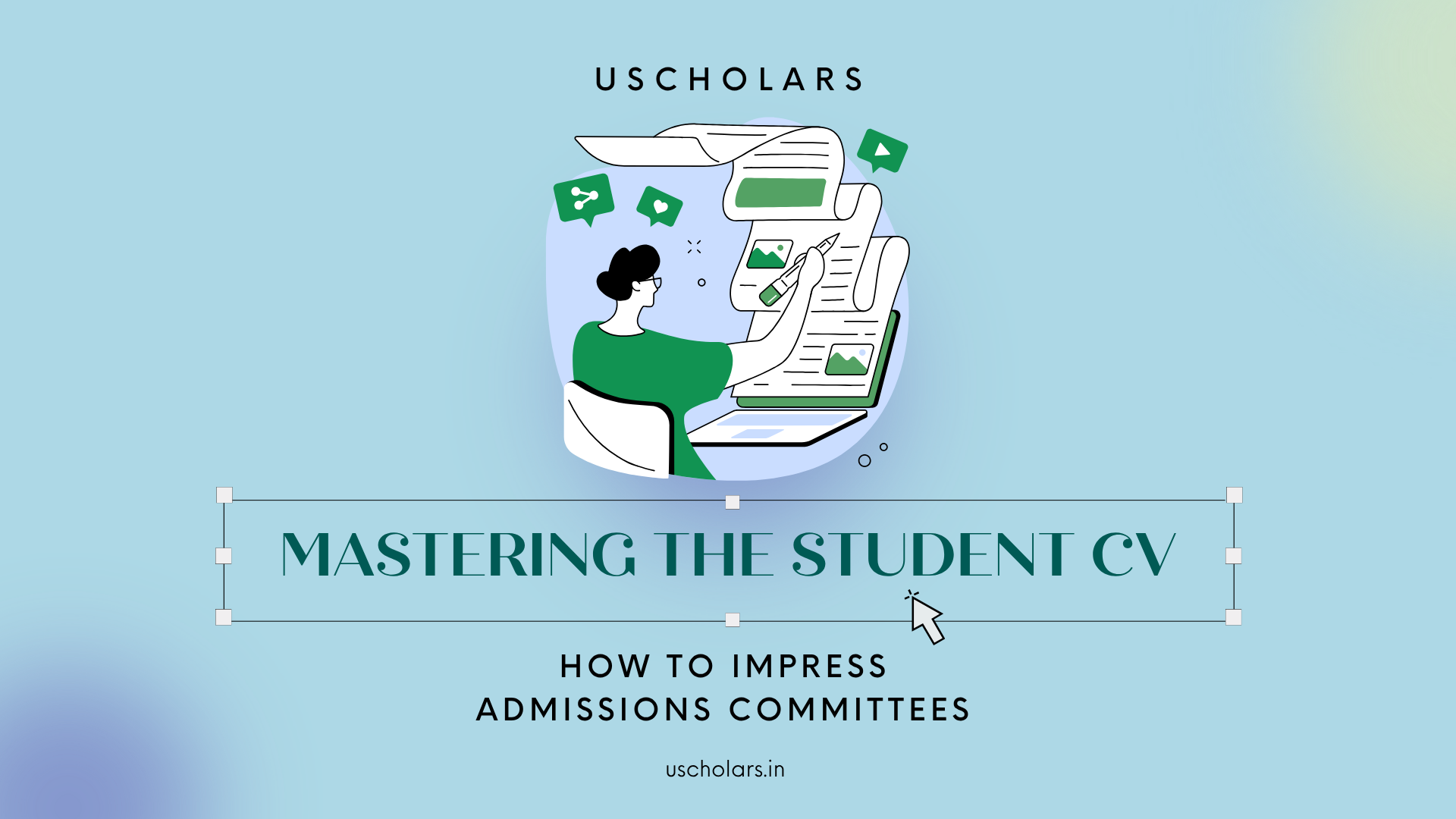Mastering the Student CV: How to Impress Admissions Committees
Your CV could be the difference between acceptance and rejection at your dream university. Think about it, when admissions officers review hundreds of applications, what makes you stand out? That’s where a strong, well-organised Curriculum Vitae (CV) comes in.
Universities require CVs to look beyond your grades and test scores. They want to understand your academic journey, extracurricular passions, research experience, and community involvement, the qualities that make you a well-rounded candidate. Along with your Statement of Purpose (SOP) and Letters of Recommendation (LORs), your CV completes the picture of who you are as a student and future contributor to the campus.
In this guide, you’ll discover exactly how to craft a compelling university application CV that captures attention and leaves a lasting impression. From structure and design tips to examples of what admissions officers value most, we’ve got you covered. And if you ever feel stuck, don’t worry, study abroad consultants can provide expert advice to refine your CV and boost your chances of admission.
What is a CV and Why Do Universities Need One?
A Curriculum Vitae (CV) is more than just a list of achievements, it’s your academic story. It highlights your education, extracurricular activities, internships, research, and volunteer experiences, giving universities a clear picture of who you are beyond grades and test scores.
Students often confuse a CV with a resume, but they’re not quite the same. A resume is short and job-focused, while a CV is more detailed and tailored for academic purposes. It allows admissions committees to understand your academic journey, leadership potential, and overall readiness for university life.
Your CV works hand in hand with your Statement of Purpose (SOP) and Letters of Recommendation (LORs). While your SOP explains why you want to study a particular programme, your CV shows that you’re prepared for it.
Pro-tip: Improve your personal statement with our SOP Writer.
Essential Sections for a Student CV
Creating a great student CV is all about highlighting your strengths, experiences, and potential. Even if you don’t have years of professional experience, the right structure can make your application stand out. Here are the key sections that a good CV must include:
-
Contact Details and Personal Profile for Fresh Graduates
Start with your full name, phone number, professional email, and LinkedIn profile (if you have one). Make sure your contact information is up-to-date and easy to find.
-
Education Background
List your schools, colleges, and universities in reverse chronological order. Include your grades, major subjects, and any notable coursework or academic distinctions.
-
Academic Achievements and Honours
Highlight scholarships, awards, or recognitions you’ve earned. They reflect your dedication and performance.
-
Extracurricular Activities and Leadership Roles
Showcase your involvement in clubs, student organisations, or sports teams. Leadership roles and teamwork experience add great value.
-
Volunteer Work and Community Service
Admissions officers love to see applicants who give back. Mention any social work, charity events, or causes you’ve supported.
-
Internships and Work Experience
Even part-time jobs or internships count! They show responsibility, time management, and practical skills.
-
Skills
List your technical, language, and soft skills, for example, proficiency in MS Office, communication, teamwork, or problem-solving.
-
Projects and Research
Include academic or personal projects that demonstrate creativity and initiative. Even school projects matter if they’re relevant.
-
Certifications and Online Courses
Courses from platforms like Coursera, edX, or LinkedIn Learning can strengthen your CV and show a commitment to self-improvement.
-
Hobbies and Interests
Mention hobbies only if they reflect valuable traits, like teamwork, creativity, or perseverance.
How to Structure Your Student CV
When it comes to crafting your personal CV, structure matters just as much as content. A well-organised layout makes it easy for admissions officers to find the most important details quickly, and that can make a huge difference.
-
Ideal Length
Keep your CV concise, one to two pages is perfect for most students. Focus on quality over quantity. Include only relevant details that highlight your strengths, achievements, and potential.
-
Choose the Right CV Format
A chronological format works best for students. This means listing your education, experiences, and achievements starting from the most recent. It helps universities see your academic and personal growth at a glance.
-
Layout Tips for Minimal Experience
If you’re just starting out, don’t worry! Emphasise your academics, skills, projects, and extracurriculars. Use short bullet points, clear headings, and consistent spacing to keep things readable and professional.
-
Design Do’s and Don’ts
Do: Keep your design simple, clean, and professional.
Don’t: Overload your CV with colours, graphics, or fancy fonts. Stick to one or two fonts (like Arial or Calibri) and plenty of white space.
-
Use Curriculum Vitae Maker and Templates Wisely
Templates and CV makers for university can save time, but choose one that’s easy to edit and looks polished. Avoid overdesigned layouts that distract from your content.
A well-structured CV not only looks good but also tells your story in a clear, confident way, exactly what universities want to see!
Common CV Mistakes Students Make (And How to Avoid Them)
Even the most talented students can lose out on great opportunities because of small mistakes in their university entrance CV. Let’s look at some common slip-ups, and how to fix them before you hit “submit.”
-
Being Too Modest
Many students tend to downplay their achievements. Don’t be shy, own your successes! Highlight what you’ve done confidently, without sounding boastful.
-
Including Irrelevant School Achievements
Your 10th-grade class position or school awards might not add much value now. Focus instead on recent and relevant achievements from high school, college, or beyond.
-
Overcrowding with Unnecessary Information
White space is your friend. Avoid cramming everything in. Keep your CV clean, focused, and easy to read.
-
Grammar and Spelling Errors
Simple language mistakes can make a bad impression. Always proofread, or better yet, ask someone else (or abroad education consultants) to review it.
-
Using Unprofessional Email Addresses
“cooldude123@gmail.com” might have been fun once, but not on your CV. Create a professional email using your name.
-
Copying Templates Without Personalisation
Generic CVs are easy to spot. Customise each CV to match your programme and highlight what makes you unique.
-
Getting the Length Wrong
Too long, and it feels overwhelming. Too short, and it looks incomplete. Aim for content that is enough to show depth without overloading the reader.
-
Not Quantifying Achievements
Instead of “Led a student club,” say “Led a team of 20 members to organise three cultural events.” Numbers make your impact clear.
-
Inconsistent Formatting
Keep fonts, bullet styles, and spacing consistent. It shows attention to detail.
Reality Check: These small mistakes can cost you an admission offer. Getting expert eyes, like those of experienced study abroad companies, can help you polish your CV to perfection.
Power Words and Action Verbs for Student CVs
When you create your resume, the words you choose can make all the difference. Strong action verbs instantly make your experiences sound confident, impactful, and professional, turning a simple list of activities into a story of achievement.
1. Action Verbs for CV That Stand Out
Start each bullet point with a powerful verb. Instead of saying “Helped with,” try:
- Led, Organised, Created, Initiated, Coordinated, Developed, Designed, Presented, Managed, Achieved, Implemented, Collaborated, or Researched.
These words show ownership, responsibility, and initiative, qualities that universities love to see in applicants.
2. Describe Responsibilities Impressively
Don’t just describe what you did, highlight how you did it. For instance:
- Instead of “Participated in a college event,” say “Coordinated a team of 10 volunteers to organise a cultural fest attended by 300 students.”
See the difference? The second version paints a clearer, more impressive picture.
3. Quantify Your Impact
Numbers speak louder than words. Whenever possible, include data or results, for example:
- “Improved club membership by 25%,” or
- “Raised ₹50,000 for a community project.”
Quantifying your impact adds credibility and helps admission officers visualise your achievements.
Using strong action verbs and measurable results will make your university application CV stand out from the crowd.
Creating a Cohesive Application: CV + SOP Synergy
When applying to universities, your CV and Statement of Purpose (SOP) aren’t just separate documents, they should work together to tell a compelling and cohesive story about you. Think of your curriculum vitae as the “what,” a clear snapshot of your achievements and experiences, while your SOP is the “why” and “how,” explaining your motivations, goals, and what drives you.
How should they complement each other?
Your CV lists your academic background, internships, and extracurriculars, but your SOP should expand on those points. For example, if your CV mentions leading a student club, your SOP can describe what you learned from that experience, how it shaped your skills, and why it matters to your future studies.
At the same time, it’s important to avoid redundancy. Instead of repeating the same details, use the SOP to provide context and personal insight that the CV can’t capture. This balance keeps your application engaging and shows consistency without sounding repetitive.
Tell a cohesive story by aligning your CV and SOP with your academic and career goals. Admissions officers will appreciate a well-rounded, clear narrative that connects the dots between your past achievements and your future aspirations.
And here’s the best part: At Uscholars, we help you create your CV and SOP, along with offering comprehensive admission guidance and counselling services. You don’t have to stress over your university application. Just come to us, and we’ll help bring your study abroad dreams to life with expert guidance every step of the way.
Why a Strong CV Is Key to University Admission Success
To wrap up, your Curriculum Vitae (CV) is more than just a list of achievements. It’s a powerful reflection of your unique academic journey and personal growth. Remember the key takeaways: keep it clear, concise, and relevant; highlight your strengths with strong action verbs; and structure your CV so it complements your Statement of Purpose and other application materials.
Starting early is crucial. The more time you give yourself, the better you can refine your CV and make it truly stand out. Plus, remember that your CV is a living document. Keep updating it regularly as you gain new experiences, skills, and accomplishments.
While this guide gives you a solid foundation, creating a standout CV that truly captures the attention of admissions committees often requires expert insight. That’s why you can count on Uscholars to guide you. We offer personalised CV and SOP writing services tailored to your target universities and programmes. Our experienced counsellors know exactly what international universities look for and can help you showcase your strengths in the best possible light.


